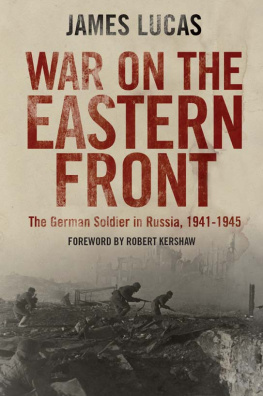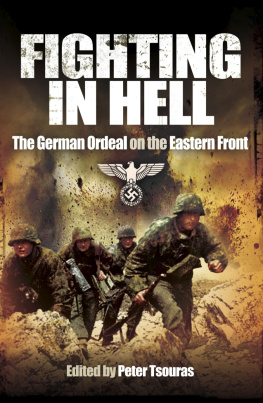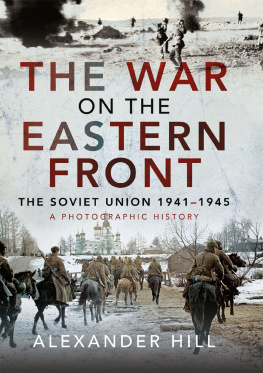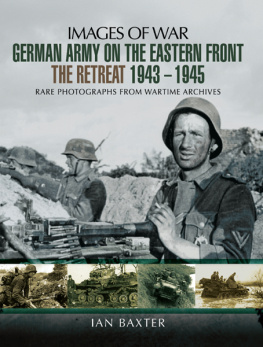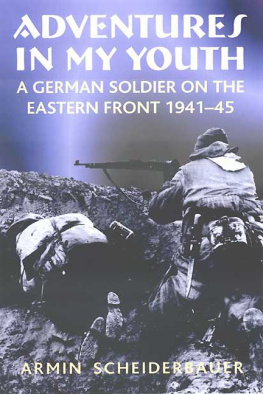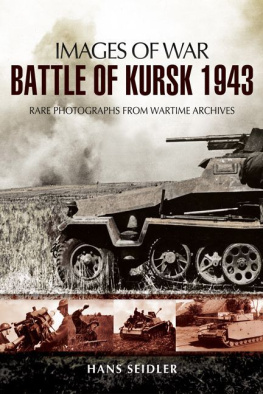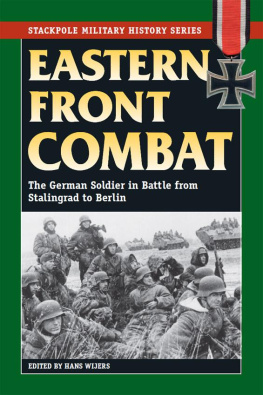WAR
on the
EASTERN FRONT
WAR
on the
EASTERN FRONT
The German Soldier
in Russia 19141945
James Lucas
Foreword by Robert Kershaw

Frontline Books, London
War on the Eastern Front
A Greenhill Book

www.greenhillbooks.com
This paperback edition published in 2014 by Frontline Books

an imprint of Pen & Sword Books Ltd,
47 Church Street, Barnsley, S. Yorkshire, S70 2AS
www.frontline-books.com
Copyright Cooper and Lucas Ltd, 1979
Foreword Pen & Sword Books Ltd, 2014
The right of James Lucas to be identified as the author of this work
has been asserted by him in accordance with the
Copyright, Designs and Patents Act 1988.
ISBN: 978-1-84832-787-0
Publishing History
First published in Great Britain in 1979 by Janes Publishing Company,
London. Published in 1991 by Greenhill Books, London.
All rights reserved. No part of this publication may be reproduced, stored
in or introduced into a retrieval system, or transmitted, in any form, or by any
means (electronic, mechanical, photocopying, recording or otherwise) without
the prior written permission of the publisher. Any person who does any
unauthorized act in relation to this publication may be liable to criminal
prosecution and civil claims for damages.
CIP data records for this title are available from the British Library
For more information on our books, please visit
www.frontline-books.com, email info@frontline-books.com
or write to us at the above address.
Printed and bound by CPI Group (UK) Ltd, Croydon, CR0 4YY
Contents
Maps
James Lucas was an admirer of the fighting qualities of the German Army in the Second World War, having been captured by them in Tunisia in 1942. Working for the Imperial War Museum he had unprecedented access to contacts and German documentary wartime material, which he used to the full. War on the Eastern Front, first published in 1979 was one of the first English accounts at the German soldier level on what was then, a little known conflict. Lucas offered this invaluable small unit perspective when there were so few definitive soldier accounts of the Russo-German war of 19415.
Few of these early accounts, Lucas included, dealt satisfactorily with the Vernichtungskrieg, or war of annihilation, that occurred on the Eastern Front. It was almost absent from Paul Carells German translated histories of Hitler Moves East and Scorched Earth in the early 1960s. Carell wrote about closely fought titanic battles invariably lost on the German side because of Hitler and the lack of resources at crucial moments in the epic struggle. The Russo-German conflict was fought between two totalitarian and ideologically motivated enemies, who indulged in inhuman excesses. Germany waged a genocidal war against the Jews. Recent modern wars have time again illustrated the extent to which moral responsibility becomes blurred around political edges. As one Wehrmacht veteran admitted in a TV interview, if some people say that most Germans were innocent, I would say they were accomplices.
Not all the combatants, as Lucas indicates, committed or witnessed atrocities, but an uncomfortable number did. Of the 19 to 20 million soldiers who fought for the Wehrmacht, about 17 to 19 million fought in Russia. The survivors were to populate and influence opinion in contemporary Germany today, so the subject is important.
Adolf Hitler was well aware of this when he announced on the 22 June 1941 The World will hold its breath when three million German soldiers and their allies conducted a surprise attack on the Soviet Union. Within four months the fighting power of the invasion force was irretrievably sapped. Lucas, telling the story from the German soldiers perspective, correctly identified the main factors: the Russians, climate and terrain, and the huge distances involved.
The Russian Colossus was completely underestimated by the Wehrmacht planners. A short campaign of six weeks was envisaged. Kick in the door Hitler proclaimed and the whole rotten edifice would come crashing down. The potential Russian strength of 200 divisions had to be reassessed at 360 by German intelligence within two months of the invasion. Despite a maligned and shabby workers paradise reported in propaganda newsreels German soldiers saw instead the massive Dnieper dams and huge modern shipyards at Nikolayev on the Black Sea. They were confronted moreover by the technological surprise of hitherto unknown heavy tank types, the KV-1 and T-34, which outclassed any known tank and were impervious to German anti-tank guns. 88mm flak guns had to be improvised and used in a ground role. Soviet Katyusha M13 multi-barreled rocket launchers were a particularly unpleasant surprise for the German infantry and technically unprecedented. Lucas describes how small German units had to cope with these technological shocks.
Lucas correctly emphasized the peculiarities of terrain and vast distances that the German soldier found physically and psychologically difficult to comprehend. The German army was not the totally mechanized Panzer force trumpeted in propaganda films like Victory in the West shown after the successful French Blitzkrieg campaign of 1940. The Ostheer, or German Army, in the East was not much unlike its Kaiserheer predecessor of the First World War; some million horses still hauled much of the artillery and logistic trains of the marching divisions of the infantry armies. Only about 16% of the German striking force was panzer and motorized. The fan-shaped front quickly overrun by its spearheads widened to 2,800 kilometres within four months and was over 1,000 kilometres deep. The breadth of this front required 280 divisions to cover it, but the Ostheer was attacking with just 127 divisions.
The fighting power of the invading German force became channeled and dissipated by the challenging terrain of the Pripet marshes and forests in front of Moscow, with few modern road and rail networks, as in Western Europe. To the south were the cornfields of the Ukraine and dusty rolling steppe extending to the Caucasus Mountains. Raising the swastika on Mount Elbrus, its 5,642-metre peak provided a momentary propaganda coup but represented a sterile waste of military resources. Rolling agricultural and steppe land facilitated the huge mobile battles of panzer encirclement from Minsk, through Smolensk and Vyazma to Moscow; but forests were no-go areas dominated by partisans.
The climate, and as Lucas points out: the foreignness of it all came as a huge surprise. Mud then snow and ice brought the panzers to a halt as much as the scouring dust of the steppe wore out engines. Between 19412, an exhausted German Army became ensnared in one of the worst Russian winters in living memory. Zhukovs counter-strike in the midst of this winter in front of Moscow may have been primitive in delivery, but it brought the Ostheer to its knees.
General Winter did not defeat Hitler; it was rather the dogged ferocity of the Russian soldier. German fighting power had already been degraded by losses in the summer encirclement battles. Although the Ostheer had inflicted three to four million casualties on the Russians before Moscow, it had lost the equivalent of 30 divisions itself. This was greater than the Northern Army Group that had launched toward Leningrad at 26 divisions strong. The dead included the cream of the veteran German leadership, more than one third of its young officers and NCOs. These men were the core of German Auftragstaktik or mission control expertise, able to operate fluidly and with great initiative. Their loss, alongside 50% of the panzer and motorized vehicles, was irreplaceable. Willpower haemorrhaged from the force as it became less mobile and able to think and react decisively tactically. In essence, the German Army in the east, victored itself to death. Hitler took over in the midst of the 1941 winter crisis and his hold in place and die order ushered in a period of inflexible and dogmatic leadership.
Next page
